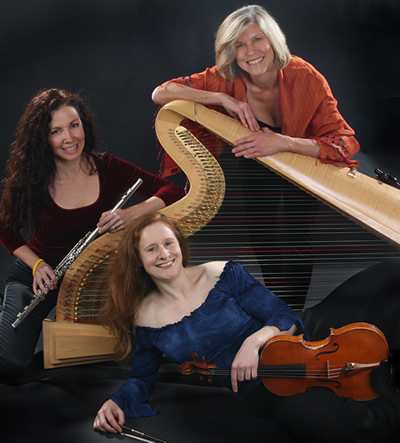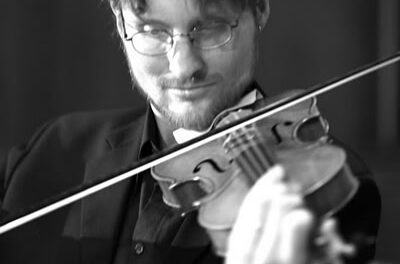This preview has been provided by Raleigh Chamber Music Guild.
On Sunday, March 15, 2015 at 3:00 PM, the Raleigh Chamber Music Guild hosts another installment in its popular Sights and Sounds on Sundays series, held at the North Carolina Museum of Art in Raleigh. This week’s concert features the Fire Pink Trio, consisting of flutist Debra Reuter-Pivetta, violist Sheila Browne, and harpist Jacquelyn Bartlett.
In a recent interview with Ms. Reuter-Pivetta, I learned that the Fire Pink Trio, based in Winston-Salem, NC, has been in existence since 2008. The combination of flute, viola and harp may seem unusual, but it is an ensemble that has considerable attraction for composers, with its combination of wind, bowed and plucked instruments. The group relies on works that are originally written for this combination, or works that have been transcribed. Fire Pink is the name of a beautiful North American mountain wild flower. Ms. Reuter-Pivetta observed that when they first performed together, there was a powerful chemistry that existed within the group, and they have been together ever since. They have just released their debut CD, entitled Poetry in Motion, which is available on the MSR Classics label.
The group has selected five works to present on March 15. The title of the program is “The Goddess in Every Woman,” in honor of International Women’s Day and Women’s History Month.
The program begins with “Doppler Effect,” composed in 1998 by Adrienne Albert (b. 1941). According to Ms. Reuter-Pivetta, this work is loosely inspired by the composer’s experience of traveling in Italy, sitting at an outdoor café and feeling the vibrancy and sensuality of the people around her. This work is included on the group’s debut CD. It is in one movement and is approximately 6 minutes in duration.
Sofia Gubaidulina (b. 1931) composed the Garden of Joy and Sorrow in 1980. This piece contains references to both Eastern and Western sensibilities. For example, the harp is instructed to use the tuning key to bend its pitch, similar to the effect obtained on a Japanese koto. At another point, the harpist is instructed to draw paper across the strings of the harp, creating a very distinctive sound effect. The viola is instructed to use extensive harmonics, which represent the Joy referred to in the title, while the flute melodies are infused with minor seconds, invoking the Sorrow of the title. The piece is in one movement and is approximately 12 minutes in duration.
Carolyn Waters Broe (b. 1957) composed “Rebirth of the Goddess” in 1992. Ms. Broe received her principal training in viola and conducting in California, and in 1991 founded the Four Seasons Orchestra of Scottsdale, Arizona. She has been the orchestra’s principal conductor since its inception. “Rebirth of the Goddess” is inspired by a story told by a Native American woman, which describes the restoration of the land after a terrible drought. The music might be described as “Southwest Impressionism.” It is in one movement and is approximately 3 minutes in duration.
Mélanie Bonis (1858-1937) composed Scènes de la forêt (Forest Scenes) in 1928. Bonis was born in France, studied composition with César Franck, and composed in a French classical style. She generally published under her masculine-sounding pen name of Mel Bonis, a common practice for 19th century women trying to negotiate gender-related obstacles in their efforts to gain public recognition of their work. Forest Scenes was originally written for flute, horn and piano, and was later transcribed for flute, viola and harp. This work was selected for the program because of its reference in the fourth movement to Artemis, daughter of Zeus and goddess of the wilderness. It is in four movements, entitled Nocturne, Dawn, Invocation, and Artemis. It is approximately 15 minutes in duration.
The concluding work on the program is by Welsh composer Hilary Tann (b. 1947), entitled From the Song of Amergin. We learn the following regarding this work from Ms. Tann’s web site:
From the Song of Amergin, is in five sections, played without a break. Three lines from Robert Graves’ restoration of the text from an ancient Celtic calendar-alphabet, the “Song of Amergin”, directly inspired the piece: “I am a wind: on a deep lake, I am a tear: the sun lets fall, I am a hawk: above the cliff.” The three inner sections are shaped by the lines of the poem (the harp is featured in wind/lake, the viola in tear/sun, and the flute in hawk/cliff) and the piece begins and ends with an evocation of “I am.” – HT
The work was commissioned originally by the Criccieth Festival with funds provided by the Welsh Arts Council, and was premiered in Pwllheli, North Wales in June 1995. It is approximately 13 minutes in duration.
About the members of Fire Pink Trio:
Harpist Jacquelyn Bartlett is on the Artist Faculty of the North Carolina School of the Arts in Winston-Salem, and also teaches or has taught at Duke University, UNC-Greensboro, and Appalachian State University, among others. She made her solo debut at age sixteen with the Chicago Symphony Orchestra, and has performed with many of the leading orchestras of our time.
Violist Sheila Browne received her training at Rice University, the MusikHochSchule of Freiburg, and the Juilliard School of Music, where she worked as a teaching assistant to Karen Tuttle for four years. She is currently on the Artist Faculty of the North Carolina School of the Arts in Winston-Salem, and has also taught at New York University.
Flutist Debra Reuter-Pivetta is a graduate of the North Carolina School of the Arts and teaches at Salem College. She is also principal flutist of the Greensboro Symphony Orchestra. She is a champion of contemporary works and has presented important premieres of works for solo flute, and chamber works that include flute. She performs and records frequently with her husband, pianist Federico Pivetta. Their recent CD release “Passion and Romance” has been aired frequently on public radio stations and has been highly praised.
Full bios are available at the Fire Pink Trio web site: http://firepinktrio.com/index.html
Kent Lyman
Meredith College













